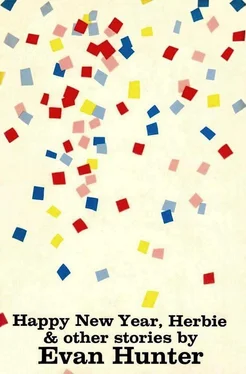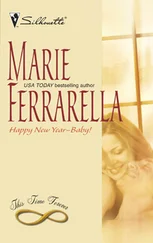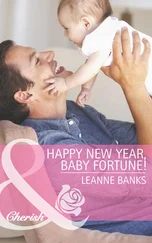“Blaney. Why?”
“Blaney,” she repeated, and then suddenly added, “Beth Blaney,” as if testing the words.
He made no comment. He shrugged in the darkness, and then he kissed her without any real desire and thought, You can feel her teeth when you kiss her.
There was passion in this girl, and beauty of a sort, and a knife-edge intelligence that sometimes made him feel awkward and clumsy. But most of the time she was pleasant and easy to be with, and he continued seeing her until eventually she seemed to have been there always.
He had no intention of marrying her, not really. Even facing the realization that he could not go through life refusing to form any real attachments, he did not once seriously think of forming an attachment with Beth McCauley. He continued seeing her because she demanded nothing of him. Until one night, by the river, suddenly and without preamble, she said, “Matt, I want to get married.”
At first, idiotically, he thought she was talking about someone else. And then immediately he knew she meant she wanted to marry him, and the idea was so preposterous that he almost laughed aloud. Well, I don’t want to marry you , he thought and said nothing, staring at the river.
“Well?” she said.
“Well, what do you want me to say?”
“Say yes or no, Matt.”
Yes or no, he thought, and he smiled a bit wryly. Yes or no, and what happens if I say “Yes”? Who vanishes this time, Beth? Who gets blasted into oblivion?
“I haven’t given much thought to marriage,” he said cautiously.
“Think about it now, Matt.”
I don’t have to think about a damn thing , he thought. I know I don’t want to marry you. I don’t love you. What’s there to think about?
“I can’t afford to get married right now,” he said. “I’m going to leave my job. I’m fed up with my job.”
“My father will give you a job, Matt.”
I don’t want a job with your father , he thought. I don’t even like your father.
“I don’t know anything about grain,” he said.
“You don’t have to know a goddamn thing,” she answered angrily, “and he’ll still pay you twenty thousand a year.”
“That’s a lot of money.”
“Yes.”
“I’d hate to think I was being...”
“Bribed?” Beth supplied.
“Well...”
“You are,” she said. “I’m twenty-eight years old, Matt, and I’m tired of necking by the river. Yes or no?”
“If I say no?”
“Is that your answer?” She rose and brushed off her skirt.
“Wait!”
“Yes or no, Matt?”
“How do you know I love you?” he said.
“I didn’t ask,” Beth answered.
He hesitated for a long while. Then, committing himself for the first time since Clyde’s death, he said, “Yes, all right,” and knew instantly who would vanish this time, knew instantly who would be blasted into oblivion.
They were married in the First Episcopal Church on top of the hill. Her family made all the arrangements, and he always looked back on it later as Beth’s wedding, not his own. The house they moved into was chosen by Beth, a high-gabled house in the middle of a dense woods. Later, because the house was in the middle of the woods, Beth insisted that they buy a gun. Apparently she had already forgotten that she herself had chosen the house and its location. That didn’t matter. She was afraid of being alone in the woods, she said, now that they had children to care for. By that time he was so used to saying “Yes” that he’d protested only weakly before agreeing and then went downtown with her to pick out the Savage. He hadn’t liked the gun from the start. The gun reminded him of the .22 he’d been firing that night at the carnival when the enchanted girl — he always thought of her as enchanted, magical — had walked soundlessly into his life on silent, sneakered feet. The gun reminded him of the five-inch cannons on the Fancher and the answering fire of the Japanese ships, and the death of Clyde Morrow.
But more than that, the gun — securely locked in a rack, out of reach of the children — was a constant and visible reminder of what he had become, or perhaps what he had always been. Yes, yes, yes, I will marry you, yes I like the house with the gables in the middle of the woods, yes we should have children, yes we need a gun, yes, yes!
This afternoon he had said “Yes” for the last time.
He picked up the shotgun he had not wanted and thought, You goddamn gun, I didn’t want you!
I didn’t want Beth, or this endless silent house, or the children, or the job with her father where Alan can come in to ask me to do something meaningless and I can say, “Yes, sure, fine, yes, yes!”
I would like to say “No” sometime, he thought. I would like to stand with my head and shoulders back. I would like to take a deep breath and then yell with all my strength, “No! I don’t want to, you bastards!”
He looked at the shotgun. He sighed gently and then put the barrel into his mouth and hooked his thumb around the trigger.
I don’t want to do this , he thought.
And fired.
It was the next poor bastard who got it.
You must understand, first, that the sun was very hot on that day and Miguel had been working in it from just after dawn. He had eaten a hearty breakfast, and then had taken to the fields early, remembering what had to be done and wanting to do it quickly.
There were many rocks among the beans that day, and perhaps that is what started it all. When Miguel discovered the first rock, he reached down gingerly and tossed it over his shoulder to the rear of his neat rows of beans. The sun was still not high in the sky and the earth had not yet begun to bake, and so a smile worked its way over his brown features as he heard the rock thud to the soft earth behind. He started hoeing again, thinking of Maria and the night before.
He would never regret having married Maria. Jesus, she was a one! There was the passion of the tigress in her, and the energy of the rabbit. He thought again of her, straightening up abruptly, and feeling the ache in his back muscles.
That was when he saw the second rock.
He shrugged, thinking, Dios, another one!
He lifted it, threw it over his shoulder, and began hoeing again. He was surprised when he came across more rocks. At first he thought someone had played a joke on him, and he pulled his black brows together, wondering who it could have been. Juan, that pig? Felipe, that animal with the slobbering lips? Pablo?
Then he remembered that it had rained the night before, and he realized that the waters had washed the soil clean, exposing the rocks, bringing them to the surface.
He cursed himself for not having thought to protect the beans in some way. Then he cursed the rocks. And since the sun was beginning to climb in the sky, he cursed that too, and got to work.
The rocks were not heavy. They were, in fact, rather small.
It was that there were very many of them. He picked them up painstakingly, tossing them over his shoulders. How could a man hoe his beans when the rows were full of rocks? He started to count them, stopping at ten because that was as far as he knew how to count, and then starting with one all over again.
The sun was very hot now. The hoe lay on the ground, the rich earth staining its long handle. He kept picking up the rocks, not looking up now, swearing softly, the sweat pouring down his neck and back. When a long shadow fell over the land before him, he almost didn’t notice it.
Then a voice joined the shadow and Miguel straightened his back and rubbed his earth-stained fingers on his white trousers.
Читать дальше












